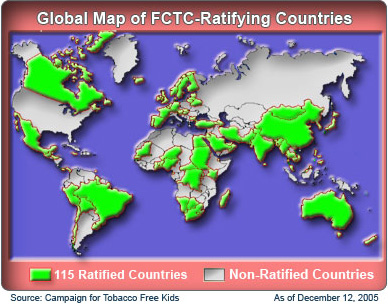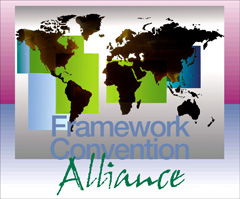
But Implementation Poses Multiple Challenges
WHO’s Framework Convention on Tobacco Control Positioned to Protect Billions Despite U.S. Failure to Ratify
by Clare Dougherty, Director, International Programs, and Ross Hammond, Consultant, Campaign for Tobacco Free Kids, Washington, D.C.

On February 27, 2005, a momentous achievement occurred in global tobacco control: Garnering its 40th ratification, the Framework Convention on Tobacco Control (FCTC) became international law.
Less than eight months later, on November 8, 2005, the same movement experienced a disappointing setback: The United States, the wealthiest and most powerful nation in the world, failed to ratify the FCTC, relinquishing any role in critical policy decisions related to the treaty and taking a back seat in addressing the global tobacco epidemic, the leading preventable cause of death in America today. Ironically, November 8th also marked the 100th ratification of the FCTC, with Brazil and Benin joining the ranks to ensure that two-thirds of the world’s population will benefit from its implementation. As of December 12, 2005, 115 countries had ratified the historic treaty.
Administered by the World Health Organization (WHO), the FCTC is the world’s first-ever public health treaty, and it could not come at a more important time. As rates of tobacco consumption are either flattening or declining in many developed countries, the tobacco industry is increasingly aiming its deadly products and deceptive marketing at the rest of the world. WHO estimates that there are 1.1 billion smokers in the world today, a number expected to rise to 1.64 billion by the year 2025. Almost 5 million people die each year from tobacco use. If current trends continue, this figure will reach about 10 million per year by 2020, with 70 percent of those deaths occurring in developing countries.
Treaty Development
Spearheaded in 1993 by Ruth Roemer, a professor of law at UCLA, and Allyn Taylor, an international lawyer, the FCTC began to take shape in 1994, when the 9th World Conference on Tobacco or Health in Paris passed a resolution calling for the negotiation of an International Convention on Tobacco Control. The process accelerated in 1998 when Dr. Gro Harlem Brundtland became the director-general of WHO. Brundtland immediately created a cabinet-level post on tobacco and demanded that work on the FCTC proceed.
The text of the FCTC was developed through almost four years of often-turbulent negotiations among WHO member states, and various objections threatened to torpedo a strong treaty until the last minute. The United States, Japan and Germany, all home to multinational tobacco companies, often assumed pro-tobacco industry positions and tried to weaken or derail the process. But the developing nations most affected by the tobacco epidemic stood firm, with unwavering support from larger non-governmental organizations (NGOs). This strategy proved highly successful and ultimately helped thwart attempts to weaken the treaty.
The FCTC was finally adopted at the World Health Assembly on May 23, 2003, and unanimously endorsed by the member countries of the WHO. As stated in the preamble, the objective of the FCTC is "to protect present and future generations from the devastating health, social, environmental and economic consequences of tobacco consumption and exposure to tobacco smoke."
The treaty enshrines policies tobacco-control and public-health experts have recommended for years as the most effective tools to reduce tobacco use. Among other things, the FCTC commits nations to ban tobacco advertising and promotion; place large, graphic health warnings on cigarette packs; raise tobacco taxes; and protect people from secondhand smoke. Like other framework conventions, such as that on climate change, there are provisions for the negotiation of separate protocols, side-agreements that refine and specify the intent of the treaty. Possible protocols include smuggling and cross-border advertising.

One by-product of the FCTC negotiations was an increase in the number of NGOs around the world working on tobacco-control policy. Many of these new advocates came into the process through their participation in the Framework Convention Alliance (FCA), a structured network of over 200 NGOs from more than 90 countries formed to ensure that the end-product of the negotiations was a strong treaty which set a floor, rather than a ceiling, on what countries could do to reduce the death and disease caused by tobacco. Throughout the negotiations, FCA members lobbied governments and used the media to praise or shame member states for their stances. The FCA continues today as a driving force in FCTC ratification and implementation worldwide. (See www.fctc.org.)
Roadblocks to Ratification
Since becoming international law in early 2005, a broad cross-section of more than 100 nations has ratified the FCTC, ranging from highly developed countries such as Japan and Canada, to developing countries such as Tonga and Niger. The FCTC has become one of the most rapidly embraced U.N. conventions in history and represents a significant step forward for global public health.
Many challenges still exist around the world that make ratification, full implementation and enforcement of the FCTC very difficult, however. One such challenge is the tobacco industry's continued offers to implement “voluntary measures” as an alternative to the FCTC on such issues as tobacco advertising and package warnings. A technique perfected by Philip Morris, the world’s largest multinational tobacco company, these proposals often appear to offer significant public health concessions. However, these voluntary measures are usually designed for public relations purposes, are rarely followed and, once political pressure is reduced, are quickly ignored.
Tobacco-control advocates around the world also face the critical issue of whether their country will move forward with full and effective implementation of the treaty or whether – due to industry pressure and/or government inertia – it will interpret the treaty so narrowly that tobacco-control laws and regulations remain virtually unchanged. To counter a weak interpretation of the treaty, FCA members have mounted a vigorous lobbying campaign to compel their governments to fully and rigorously implement the FCTC.
Although Mexico ratified the FCTC in 2004, the government recently struck an agreement with tobacco behemoths BAT and Philip Morris. In return for a government pledge not to raise tobacco taxes, the companies agreed to make tax-deductible contributions to an emergency health care fund. An official with the National Public Health Institute maintains that “by accepting donations from the tobacco companies in exchange for a tax break, [the Mexican government] is violating the Framework Convention,” which states that parties to the convention are obligated to implement tough tax and price policies aimed at curbing tobacco consumption. The official was quoted in the press as saying that the agreement has been used by the companies “to put an end to the firm hand used against them in Mexico.”
Malaysia also ratified the FCTC in September 2005. Yet, just recently, the Malaysian government postponed for the second time a 2004 ban on “kiddie-packs,” cigarette packs with less than 20 cigarettes. BAT, Japan Tobacco and Philip Morris all sell these small packs, which are more affordable to the country’s young people and poor. Although the government has publicly stated that the decision was made in the interest of the 13,000 tobacco farmers in the country – a bizarre defense given the nation’s huge imports of foreign tobacco leaf, this display of government support for tobacco over public health underlines the many hurdles to full FCTC implementation and enforcement.
Action and America
In February 2006, countries that have ratified the FCTC will convene in Geneva for the first meeting of the Conference of the Parties (COP), the intergovernmental body that will oversee the implementation of the treaty. Although former Health & Human Services Secretary Tommy Thompson signed the FCTC on behalf of the United States in 2003, America did not ratify the treaty by the November 8, 2005 deadline and, thus, will not play an official role at the COP.
The Campaign for Tobacco Free Kids and other U.S. NGOs continue a campaign to convince the United States to ratify the FCTC. As home to Philip Morris, the United States has a special obligation to provide global leadership in reducing the alarming rates of death and disease caused by tobacco use. U.S. ratification and support for the treaty even now would signal to the rest of the world that America puts the interests of public health ahead of the interests of tobacco companies. In addition, ratification in the near future may secure at least partial U.S. participation in implementing the treaty and negotiating side-agreements on issues of special importance to the nation, such as cigarette smuggling. To take action, Americans are encouraged to visit www.tobaccotreatynow.org and contact their congressional representatives.
The FCTC has the potential to save millions of lives; however, while there is much to celebrate, most of the hard work lies ahead. Partnership will play a major role in future progress: Together, countries around the world can protect their citizens from the dangers of tobacco by ratifying the treaty and effectively implementing it as soon as possible.
[back to front page....]